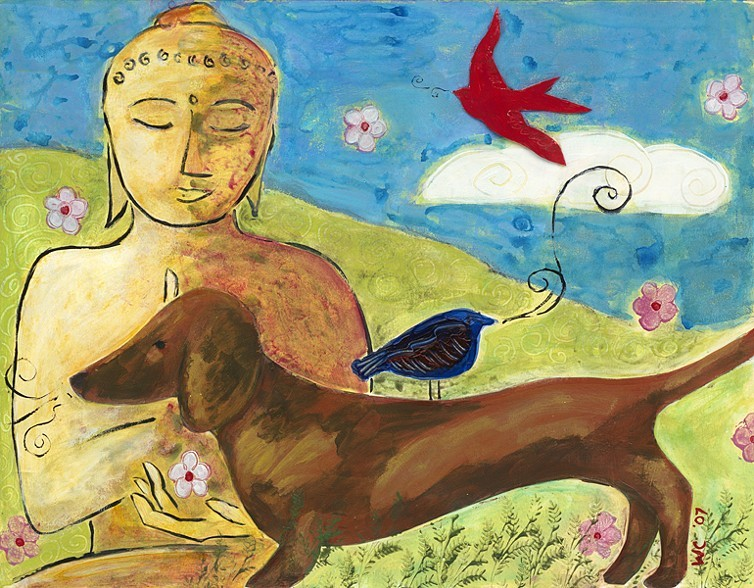As a film and literature enthusiast, I am always on the look out for stories that evoke the Dharma. Today, I have a gander at the poem “Happy as a Dog’s Tail” by Polish Poet Anna Świrszczyńska (aka Anna Swir).
Happy as a Dog’s Tail, by Anna Swir

Happy as something unimportant
and free as a thing unimportant.
As something no one prizes
and which does not prize itself.
As something mocked by all
and which mocks at their mockery.
As laughter without serious reason.
As a yell able to outyell itself.
Happy as no matter what,
as any no matter what.
Happy
as a dog’s tail.
(Anna Swir, 1985)
Funnily enough, I have always loved devouring fictitious books, but I have never been drawn to poetry in the same way. Don’t get me wrong, it is a wonderful art form and I have certainly been touched by poems that others have shared with me—it’s just that I have never really feet compelled to explore poetic expression in any great depth.
One of my Buddhist teachers often started her meditation class reading a poem, and her wise selection fostered a sense of purposeful awareness that enhanced our upcoming session. One day she asked us students to share a prized poem at our next sitting, and, despite my lack of familiarity with the art form, Happy as a Dog’s Tail is the first thing that came to my—I want to say “mind,” but really it came to my heart.
The imagery conjured by the title of the poem is enough to uplift my spirits—thinking about a dog wagging its tail in delight must provide me with the same release of dopamine that does pouring over images of pooches on Instagram! Dogs in general are easily content, and their simple and playful disposition is incredibly soothing to my soul.
There is a sense of letting go in this poem that I find liberating: in giving us permission to be “unimportant” and “not prized,” the author encourages us to release our grip on our sense of self. To me, this is reminiscent of the Buddhist teachings of Anatta (Pali: non-self). After all, it is highly unlikely that dogs think about how they appear to the outside world, and this lack of self-importance allows them to be “happy” and “free.”
The poem and its protagonist, the dog’s tail, do not take themselves seriously, and are even the object of mockery and silliness. My personal impression is that Swir is promoting a healthy sense of embarrassment, which is also reminiscent of some Buddhist practices. It brings to mind the many depictions of the laughing Buddha (some of which are extravagant in their derision), or Zen Buddhist Koans that turn the practitioner’s entrenched beliefs upside down.
Ultimately, my understanding of the poem is that, having a light approach when it comes to our sense of self and life, allows one to be content whatever the external circumstances. Cultivating a simple attitude allows us to be “happy no matter what, as any no matter what.” How wonderful to be open to the many simple joys that make a dog wag its tail!

